| History - 49th A.I.B. - Company 'B' |
 | Index
|
| Index
| | Next |
| Next |
|
(Pages 37-39)
|
21 April (con't)
of the squads in the platoon acted as a base of fire. The second squad approached the hill, and sent out it's two scouts to reconnoiter the area. These two scouts, Cheever and Walker, moved up the hill, to run upon four SS men dug in at the top. Walker shot one, and the rest surrendered. Later the squad continued along the top of the hill and captured four more Germans, including one officer. Later the platoon sent out two patrols to capture Krauts leaving Blankenburg, and several more prisoners were taken.
The tanks then moved up, with the first and second platoons acting as flank cover, to the high pound overlooking the town. Here the tanks fired five rounds apiece into the town, and withdrew. About 15 P-47s then came over to bomb and strafe the town, incidentally providing a swell show for the doughs on the hill, as we had an unobstructed view of the whole operation. SHAEF set up a sound truck, and broadcast surrender terms to the defenders of the town. For a time no action took place, and we waited around on the hill for further instructions.
Several prisoners began drifting in to the first platoon positions shortly after noon, among them a sergeant from the wagon trains of the 116th Panzer Division, who said that he was authorized by his commander to negotiate for a surrender of the hundred-odd horse drawn vehicles and men of that unit. We were told that the men biding in the woods would surrender if tanks were brought up into position before the woods. The first platoon was mounted on tanks from C Co., 36th Tank Bn., and advanced
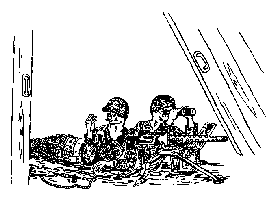
|
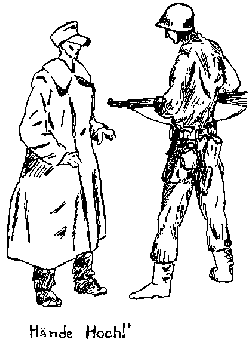
on the woods, from which 200 odd prisoners came out to surrender. The tanks then proceeded parallel to the woods until they reached the outskirts of Blankenburg, where they were ordered to hold up and await further orders. Just before reaching this point, however, a burst of machine gun fire from the woods raked the back of the lead tank. The men dove for cover and the tanks opened up on the woods with their weapons. The enemy either was killed or retreated for no more fire was received from the woods, and the platoon didn't investigate further.
Meanwhile, Captain Griggs, who was sitting on the top of a hill overlooking the town was approached by a Colonel, and was asked, 'Are you from the Infantry?' Captain Griggs admitted that he was, and was ordered, "Then go take that town.' With these battle orders we moved out to take Blankenburg at about 1700.
The first platoon moved in from the left flank, and the second and fourth platoons moved in from the front, with the third platoon in support. A Co. later came in from the right flank. With newsreel cameramen from SHAEF grinding out the action, the second platoon tore down a road-block, and the third and fourth platoon
|
-- 37 --
|
poured through to start on the business of clearing out the town. At this point the fourth platoon met its only opposition, one man in a foxhole, which was quickly disposed of and no opposition further was encountered.
Each platoon was assigned to a certain area, and we moved through the town in rapid order, clearing out the houses and picking up Schnapps on the way, bothered occasionally by the hundreds of prisoners who poured out to surrender. Organization broke down to a great extent from the enormous area that we had to cover, and for the most part we moved through in small patrols of two or three men apiece, clearing out along the way as best we could.
We collected and reorganized in the center of town, but Debrey, who was out with Bahnsen looking for prisoners, and O'Donnel who was looking for billets, as well as several others who were looking for anything, continued to bring in prisoners by the hundreds. The total for the battalion for the day was nine hundred, and we took the greater share of these. Several blocks in the center of the town were still blazing, and the firefighters of Blankenburg were busily fighting the fire, unmindful of the conquering army about them moving out to billets, which for some were

|
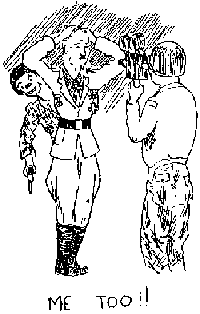
located in the former residence of a German Major General Von Funck, by name. Pfc. 'Amos' Morgan was injured during this operation, as was T/5 Bernard Kramer. Pfc. William Pfau, was tragically killed in this our last engagement with the enemy.
The prisoner total mounted high during the day, as Krauts from the woods and surrounding territory continued to stream in. Most of the morning was spent checking different areas in the town while it rained. Of the scattered and broken units we faced and captured there were elements of Potsdam Regt, a Grenadier Replacement and Machine Gun Battalion, the 11th Lippstadt Regt. of the Potsdam Division 146, 5th Parachute Division, 16th Motorized Division, Signal Regt 502, 1st Pioneer Training Regt., and the 116th Panzer Trains.
23 April
Today we were told that as far as we were concerned the fighting in Europe was over. The reason for this was that the Ninth Army had reached its objective and had orders to hold fast where they were. We felt pretty good about that. We moved out of Blankenburg to our area of occupation.
|
-- 38 --
|
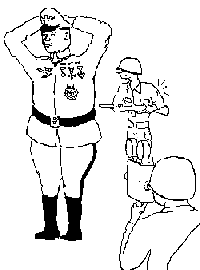
And the 3rd platoon drew Heimberg, the second drew Benzingerode, while the first, fourth and headquarters drew the large town of Wernigerode. Guard duty was very heavy, and there were many road blocks to man, but war had for the most part passed this area, and there was plenty of time for rest and relaxation, while we followed the war over the radio and in the papers, and sweated out the CBI. The company began to grow instead of dwindle, as men began to return from the hospitals. And higher headquarters began to worry about the men having too much free time, and turned their attention from the business of fighting a war to mapping a training schedule, and holding formations and inspections.
8 May
We moved from Wernigerode to Wahmbeck, where we celebrated V. E. Day, six months almost to the day after we had steamed out of New York harbor, bound for Europe. We had received praise for our work both as a unit and as individuals. Pfcs Timothy Burke and Herbert Walker received Silver Stars for their patrol work and for
|
their aggressive action against the enemy. Pfc. Bowman received the Bronze Star for action at Trieste, Pfcs Hemandez and Steward received the Bronze Star for their patrol work, and Pfc. White received the Bronze Star for aggressive action against the enemy. Lt. Bell received one for the job he did taking over the company in combat. Others, though not officially recognized for their deeds, won the gratitude and admiration of their buddies for performing magnificent jobs in the heat of combat, which will not be forgotten, and we have tried as much as possible to recognize some of these in this history. Others fell by the wayside, some to return to us later, others never to return. We are proud of our outfit, of ourselves, and of our buddies. That's the story.
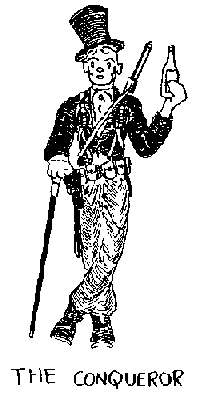
|

|
-- 39 --
|